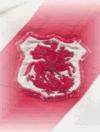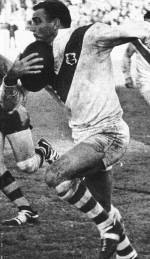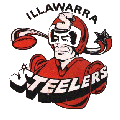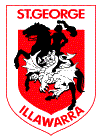|
  In
1908, St George almost joined the New South Wales Rugby League
following a meeting at Rockdale Town Hall. At that meeting,
a St George Rugby League club was definitely formed with a president
and other officials being elected. But the new club was unable
to form a team when pressure from the Rugby Union saw only three
players sign up. In
1908, St George almost joined the New South Wales Rugby League
following a meeting at Rockdale Town Hall. At that meeting,
a St George Rugby League club was definitely formed with a president
and other officials being elected. But the new club was unable
to form a team when pressure from the Rugby Union saw only three
players sign up.
In 1910, a St George Third Grade team entered the competition.
They won their first game in convincing fashion, defeating
the Newtown Thirds 36-0.
On Monday 8 November 1920, at the Kogarah School of Arts,
a St George District Rugby League club was formed with the
view of entering a First Grade team into the 1921 competition.
On St George's Day (April 23) 1921, a St George First Grade
side finally entered the Sydney premiership, narrowly losing
their first game 4-3 to Glebe.
In 1927, St George were runners up and in 1928, they were
minor premiers for the first time.
In the 1930s, The 'Dragon Slayers' as they were known, were
again runners up in 1930, 1933 and 1937. In 1935, St George
posted a premiership record when they defeated Canterbury
by 91-6 at Saints' old home ground at Earl Park.
In 1941, St George finally won their first premiership when
they defeated Easts 31-14 at the Sydney Cricket Ground.
Saints were runners up in 1942 and again in 1946 before winning
a second premiership in 1949.
In 1950, St George left Hurstville Oval began their long association
with Kogarah Jubilee Oval
as a home ground.
In 1953, St George were runners up when they went down to
Souths in the Final.
The St George Dragons cemented themselves as one of the world's
greatest sporting clubs when they won and unprecedented 11
straight premierships between 1956-1966. They were undefeated
in 1959 and won all three grade Grand Finals in 1963. Immortals
such as Graeme Langlands, John Raper and Reg Gasnier were
just a few of the greats who wore the red and white during
these golden years.
The Dragons were Grand finalists in 1971 and 1975 before St
George and Parramatta played in the historic drawn Grand Final
of 1977, the match ending at 9-all after extra time. The young
Saints team came out the following week to defeat the Eels 22-0
in the 'Grand Final replay'.
In 1979, St George won their 15th premiership after defeating
Canterbury 17-13 in the Grand Final.
St George played in five more Grand Finals in 1985, 1992,
1993, 1996, and most recently in 1999 as the 'St George-Illawarra
Dragons' following Rugby League's first successful joint venture.
To this day, the St George Dragons in their famous 'Red V'
jersey are probably the most well known Rugby League name
in the world.
 The
Illawarra Steelers entered the premiership in 1982 during
one of the game's expansions. Basing themselves in Wollongong,
it seemed that their inclusion into the NSWRL Sydney premiership
was long overdue. The
Illawarra Steelers entered the premiership in 1982 during
one of the game's expansions. Basing themselves in Wollongong,
it seemed that their inclusion into the NSWRL Sydney premiership
was long overdue.
The Southern Division competition has a long history which
can be traced back to 1910. In 1946, they beat England 15-12
and did the same in 1950 defeating Great Britain 18-11.
Charlie 'Saus' Hazleton was the first Illawarra international
in 1937/38 and like many top class players he soon found himself
in the Sydney Competition playing for St George (1939 and
1940). The Wollongong area has produced many great players,
including Graeme 'Changa' Langlands, 'Slippery' Steve Morris
and Rod Wishart.
Illawarra Steeler's best year was in 1992 when they finished
third on the ladder and made it all the way to the preliminary
final before being beaten by St George by just 4-0.
In late 1998, Illawarra and St George joined forces to become
known as the 'St George - Illawarra Dragons' who went on to
be 1999 grand finalists.
 In
September 1998, the St George Dragons and the Illawarra Steelers
made history when they formed Rugby League's first successful
joint venture, the 'St George Illawarra Dragons'. Overall,
this was a popular move as both clubs had many things in common.
In 1999 the Dragons almost pulled off a remarkable year when
they made the semi-finals and appeared unstoppable as they
suddenly hit top form. They went into the Grand Final as favourites
but went down narrowly 20-18 in controversial circumstances
when Melbourne were awarded a penalty try just before full
time. In
September 1998, the St George Dragons and the Illawarra Steelers
made history when they formed Rugby League's first successful
joint venture, the 'St George Illawarra Dragons'. Overall,
this was a popular move as both clubs had many things in common.
In 1999 the Dragons almost pulled off a remarkable year when
they made the semi-finals and appeared unstoppable as they
suddenly hit top form. They went into the Grand Final as favourites
but went down narrowly 20-18 in controversial circumstances
when Melbourne were awarded a penalty try just before full
time.
Debates over home ground, club identity and recruitment continued
into 2002.
In 2003, the St George Illawarra Dragons returned to Kogarah
Jubilee Oval for the first time since 1999 with Wollongong
and St George districts both sharing home ground matches.
This coincided with a club journal announcement that the history
of the clubs would unite with the next Dragons Grand Final
win being premiership number 16.
|

